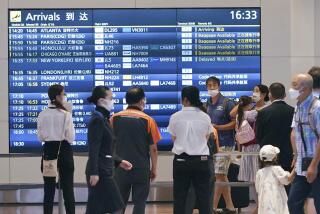Japan Urges Consumers t ‘Buy American’; U.S. Cool : 3-Year plan Offered to Spur Trade
- Share via
TOKYO — Japan, under U.S. pressure to reduce a $37-billion trade deficit, announced a three-year plan today to open the nation’s markets to foreign trade, and Prime Minister Yasuhiro Nakasone pleaded with shoppers to buy American and other foreign goods.
No quick results are expected from the Japanese plan, and reaction from the Reagan Administration was muted. Congressional critics and U.S. businesses were openly disappointed.
Nakasone, in a nationally televised speech after the program was announced, urged the Japanese people to buy more imported products to help relieve mounting trade frictions between Japan and its trading partners.
“I ask all of you to be on the lookout for foreign products when you visit the supermarket or department store,” he said.
“This is a life-and-death affair (that could lead to) a terrible depression,” Nakasone said in reference to protectionist measures pending in Washington.
7th Offered in 4 Years
The Japanese program was the seventh presented in four years and contained few concrete details.
A 10-man government advisory committee recommended that Japan open up its markets in stages over the next three years.
Noting that Japan risks becoming an “international outcast” because of its huge trade surpluses, the report urged measures to lower tariffs, stimulate domestic purchasing of imports and simplify the certification of foreign products.
In the package are pledges to accept foreign clinical test data for medical equipment, eventually lower tariffs on plywood products, simplify technical standards for computer equipment and ease the way for the purchase of American communications satellites.
Nakasone pledged that the government will prepare the action plan “as soon as possible and seek its implementation without delay.”
Not Likely to Satisfy U.S.
But neither Nakasone’s appeal nor the market opening package is likely to satisfy U.S. demands.
Vice President George Bush said in Washington that Nakasone’s appeal “took a good deal of courage,” but added: “What’s important . . . is what follows on, what actually happens in terms of access to market.”
At the State Department, spokesman Edward Djerejian said the principles enunciated “are commendable, especially those which recognize that drastic change of the Japanese trading system is needed. . . .”
Treasury Secretary James A. Baker III echoed Bush’s cautious statement, saying, “I don’t think you can say we are disappointed because, quite frankly . . . we haven’t really had a chance to study them in detail.”
Sen. John C. Danforth (R-Mo.), sponsor of legislation requiring U.S. retaliation unless Japan lowers its trade barriers, said: “The only thing that counts is results. . . . The United States should accept nothing less than real market access. . . .”
‘Did Not Go Far Enough’
American business leaders called Japan’s move a step in the right direction but one that falls short of solving some persistent problems.
“They did not go far enough, but we are encouraged by the fact there is some movement at the highest level,” Ralph J. Thompson, senior vice president of the American Electronics Assn., said.
Ford Motor Co. spokeswoman Mary Joseph in Detroit said Japan’s announcement could be a “step in the right direction,” but it did not include enough “auto specifics” for the car maker to comment further.
In Boston, Laurence Fish, former head of Bank of Boston’s Toyko branch, said Japan’s new position was “jibidwok,” or nonsense. “We’ve heard this before. We’ve been trying to internationalize the yen for 10 years,” Fish said.
More to Read
Inside the business of entertainment
The Wide Shot brings you news, analysis and insights on everything from streaming wars to production — and what it all means for the future.
You may occasionally receive promotional content from the Los Angeles Times.










